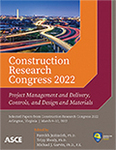A Pattern-Recognition Method for Highway Construction Project Expenditure Cash Flows Using Clustering-Based K-Means Approach
Publication: Construction Research Congress 2022
ABSTRACT
An accurate cash flow model is essential because it helps state highway agencies forecast the funding obligations, reduce the financing burden, and streamline the delivery of their highway projects. Thus, the primary objective of this study is to discover the pattern of expenditure curves of highway projects and empirically explore the associations between affective factors and patterns of highway project expenditure curves. This paper analyzed the cash flows of 554 completed highway projects let in the State of Georgia. This study identifies five cash flow clusters using the unsupervised k-means clustering and analyzes the patterns of construction expenditure project cash flow with project-related attributes using multinomial logistic regression. Seven attributes, including owner estimate, number of pay items, and types of pay items, have statistically significant impacts on the shape of expenditure cash flow of highway projects. This study contributes to preparing more accurate estimates on expenditure cash flow for a project, making better letting/bidding decisions, and managing finance more effectively.
Get full access to this article
View all available purchase options and get full access to this chapter.
REFERENCES
Baek, M., and Ashuri, B. (2019). Analysis of the variability of submitted unit price bids for asphalt line items in highway projects. Journal of Construction Engineering and Management, 145(4), 04019020.
Boussabaine, A. H., and Elhag, T. (1999). “Applying fuzzy techniques to cash flow analysis.” Constr. Manage. Econ., 17(6): 745–755.
Camph, D. H. (2008). Issues of Compliance with Federal Requirements for STIPs, TIPs, and Long-Range Plans. American Association of State Highway and Transportation Officials (AASHTO) Standing Committee on Planning. Los Angeles, CA.
Chen, H. L., O’Brien, W. J., and Herbsman, Z. J. (2005). “Assessing the Accuracy of Cash Flow Models: The Significance of Payment Conditions.” J. Constr. Eng. Manage., 131(6): 669–676.
Hartigan, J. A. (1975). Clustering algorithms. John Wiley & Sons, Inc.
Han, S. H., Park, H. K., Yeom, S. M., and Chae, M. J. 2014. “Risk-integrated cash flow forecasting for overseas construction projects.” KSCE J. Civil Eng., 18(4): 875–886.
Henkin, T. (2009). Debt Finance Practices for Surface Transportation (Vol. 395). Transportation Research Board.
Jarrah, R. E., Kulkarni, D., and O’Connor, J. T. (2007). “Cash flow projections for selected TxDOT highway projects.” J. Constr. Eng. Manage., 133(3): 235–241.
Kaka, A. P. 1996. “Towards more flexible and accurate cash flow forecasting.” Constr. Manage. Econ., 14(1): 35–44.
Kenley, R., and Wilson, O. D. (1986). “A construction project cash flow model – an idiographic approach.” Constr. Manage. Econ., 4(3): 213–232.
Liang, Y., Ashuri, B., and Li, M. (2021). “Forecasting the Construction Expenditure Cash Flow for Transportation Design-Build Projects with a Case-Based Reasoning Model.” J. Constr. Eng. Manage., 147(6): 04021043.
Maulik, U., and Bandyopadhyay, S. (2000). Genetic algorithm-based clustering technique. Pattern recognition, 33(9), 1455–1465.
Navon, R. (1996). “Company-level cash-flow management.” J. Constr. Eng. Manage., 122(1): 22–29.
Šelmić, M., Macura, D., and Teodorović, D. (2012). Ride matching using K-means method: Case study of Gazela Bridge in Belgrade, Serbia. Journal of transportation engineering, 138(1), 132–140.
Zayed, T., and Liu, Y. Q. (2014). “Cash flow modeling for construction projects” Eng. Constr. Archit. Manage., 21(2): 170–189.
Information & Authors
Information
Published In
History
Published online: Mar 7, 2022
Authors
Metrics & Citations
Metrics
Citations
Download citation
If you have the appropriate software installed, you can download article citation data to the citation manager of your choice. Simply select your manager software from the list below and click Download.
